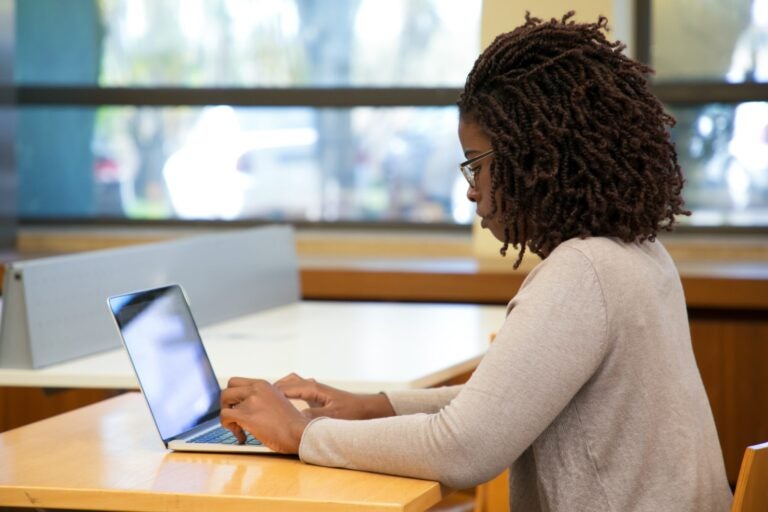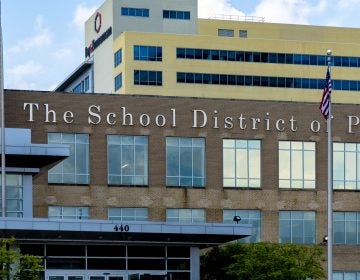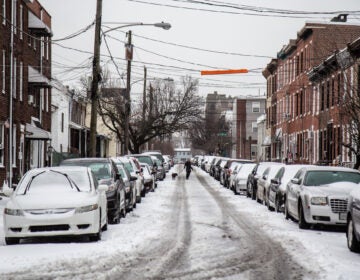With Philly’s revised virtual learning plan, advocates call for expanding internet access
Some say the city and corporate players need to display more urgency.

(Freepix.com)
This article originally appeared on The Notebook.
—
As the Philadelphia School District announces that digital learning will continue for all students at least through November, there is more urgency to solving the issue of universal internet access across the city.
Board President Joyce Wilkerson said the responsibility to make sure all families have access goes beyond the School District to the city and the internet service providers.
“My position is we’re not starting school unless every child is connected,” said Wilkerson. “If we have to pay for it, we’ll pay for it. But we can’t pretend we’re running school virtually, and we have children who have no way of getting connected.”
She notes that personal hotspots are $190 a person “for just a one-year commitment.” The District bought 2,500 of them for families this spring.
Wilkerson added that it would be a “disgrace” for the city “if we started the school year knowing children don’t have supportive environment to be in school virtually. Those for me are huge issues. The onus is on not just the District but the broader community to do its best to put their resources together so all children have the opportunity to be successful.”
Councilmember Helen Gym agreed.
“The city needs to get its butt in gear,” Gym said. “I don’t think there has been a serious effort to make this happen at any level.”
The District has estimated that as many as 5% of its students do not have reliable access to the internet. Since March, when schools abruptly closed, the District spent $11 million to buy and distribute upwards of 40,000 Chromebooks to families, and will continue to do so, according to the revised reopening plan announced Tuesday by Superintendent William Hite. City officials have said that up to 10% of students in the city have transient home lives.
A 2019 survey by the District found that only 45% of students in grades 3-5 had access to the internet from a computer at home; 56% of students in grades 6-8 and 58% of students in grades 9-12 had access.
According to a letter sent to staff and families on Tuesday, “City leaders are …working with numerous local internet companies to provide reliable internet access to all Philadelphia students who need it for the start of school and throughout the school year.”
The city earlier this month publicized its plan to expand digital access. It has a goal of “ensuring all K-12 public school students have consistent access to the technology, internet, and supports they need to engage in remote learning in the fall of 2020 and beyond.” The city is “reimagining the future of public computing centers,” and “guaranteeing that all Philadelphians have access to affordable and reliable digital solutions” for work, education, and healthcare, the plan says.
In addition, the city is creating a Digital Equity Coordinating Committee to “work with a broad range of stakeholders and communities to create solutions.”
Gym said that effort is fine, but “not a direct response to the pandemic … I don’t think it has the urgency that meets the crisis we’re facing right now. We need something faster and bolder.”
Comcast, the primary internet service provider in the city, has expanded its Internet Essentials program, which provides basic service for less than $10 a month. When schools shut down in March, it offered two months free to new customers. It also opened its public hotspots to general use.
But there were numerous reports of people having trouble signing up due to a lack of proper paperwork, language barriers, no permanent address, or a past history of overdue bills. Comcast modified its criteria, including those regarding past debt, but problems remained, Gym said.
“Right now, the barriers to getting online are too high, and it’s not just about money,” she said. “It’s about the application systems are in English, students and families are transient. Any address-based system will have flaws in a city that sees 19,000 evictions in any given year…What do I tell a parent with two kids who can’t speak English and can’t afford the internet.”
Plus, the speeds offered by Internet Essentials aren’t fast enough to allow students fully take part in online classes, especially if there are several children in one household, she said.
Gym and other advocates have called on Comcast and other service providers to open up residential hotspots as a “temporary” measure while the city – and, presumably, the nation – work toward a solution to make broadband more widely available. The providers say this is technically difficult and raises other concerns, including privacy issues.
Gym and other advocates dispute this.
“This is temporary,” she said, “so students can get online. We can’t have internet service rooted to an address. We need, for a short period of time, to open citywide broadband network accessibility. This is something that has been asked for for a while.”
In May, Sens. Cory Booker, Kamala Harris and Ron Wyden asked Comcast to open up its hotspots that are enabled on the Xfinity routers used by home subscribers.
According to an article in Ars Technica, the three wrote a letter to Brian Roberts, the Comcast CEO, who personally donated $5 million to help buy Chromebooks for Philadelphia schoolchildren.
While Comcast “has taken important steps” to help more people get connected, “it can – and should – do more to help children and teachers…across the country,” wrote the senators, all Democrats. “We urge you to start by dropping the paywall and providing free access to Comcast residential public Wi-Fi networks.”
The senators said Comcast’s response that this would increase congestion and impact the speed for the paying subscribers “does not add up,” citing past company statements that the public and private networks operated by its residential routers “are completely separate.”
If that is true, the senators said, “it should not matter if the person using it has paid Comcast for a Wi-Fi access pass or if they are a low-income school child trying to do their homework.” If that is not true, they said, then Comcast had not been leveling with its customers.
Shortly after school shut down in March, Superintendent William Hite said he had asked Comcast, which has its corporate headquarters in Philadelphia, to open up the residential hotspots, and he was rebuffed.
Gym said there needs to be more “affirmative communication” between the city and District with Comcast and other internet service providers.
“The education of a generation of children now relies on internet connectivity,” Gym said. “This is a temporary and necessary act, not of charity but of economic security and of educational necessity.”
But beyond that, she added, the country needs to “move away from the idea that internet is for-profit and only reserved for those who can pay. In a pandemic, all of us, including corporate actors, need to pull together and make sure children are safe and cared for. This cannot be about profit. This is a crisis, and we need bold action.”
Donna Cooper, executive director of Public Citizens for Children and Youth (PCCY), said that while she thinks the internet should be regulated as a utility, “that is not pertinent here.” Like Gym, she said that Comcast and Verizon, which also has an office building in Philadelphia, should do more to now ensure that online education is effective and today’s students won’t suffer lifelong consequences.
“I’ve got to hope that since we are the home city of one of the largest internet providers in the country and [host] one of the largest telecom providers, these two partners will be good corporate citizens,” Cooper said. “Their home grown children need to be able to learn, and [the corporations] have the wherewithal, skills and capacity to solve this problem. I hope that using this moment of reckoning with both a public health crisis and a racial equity crisis, they will step up to make sure all children have the connectivity with high enough quality and with a device that makes it possible for them to learn remotely.”
Comcast officials indicated a willingness to comment but had not done so by the end of the day. The story will be updated when they respond.

Get daily updates from WHYY News!
WHYY is your source for fact-based, in-depth journalism and information. As a nonprofit organization, we rely on financial support from readers like you. Please give today.




![CoronavirusPandemic_1024x512[1]](https://whyy.org/wp-content/uploads/2020/03/CoronavirusPandemic_1024x5121-300x150.jpg)


